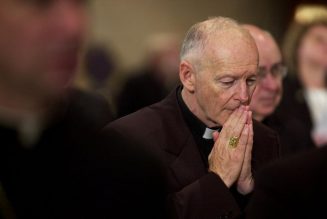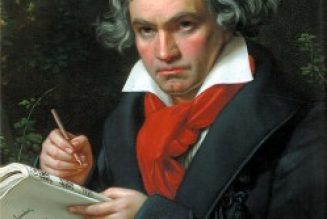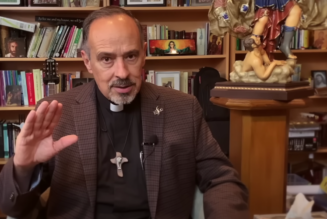In a relatively recent children’s animated movie sequel, “Sing 2” (yes, the sequel to Sing!), the producers succeeded in getting the famous lead singer “Bono” (from the band U2) to be the voice for the main hero of the movie. Bono is voice-over for a lion named Clay Calloway, a former “Rock-Star,” who, when challenged (by the porcupine named Ash) to overcome his own self-imposed loneliness and isolation, returns to the stage to perform U2’s great piece, “I Still Haven’t Found What I’m Looking For.”
For me, the Generation X father of 6, it was a deeply moving experience to see the movie culminate with this song; in contrast, my children were probably at that point just hearing another popular culture “hit” sung by what appeared to be an animated lion and porcupine. I grew up listening to U2, and, after my conversion to Christianity, have found great solace in the fact that songs like this one were actually deeply meaningful reflections on the spiritual life of the Christian. In this case, the message also taps into a theme that became of seemingly great importance to the late great Pope — then Emeritus — Benedict XVI and is a way to say goodbye to our beloved former Holy Father.
The song, “I Still Haven’t Found What I’m Looking For,” is the reflection of the faithful Christian who has been drawn to Christ through attraction and desire but who now feels that some type of longing is left unfilled. It is an expression of a divine eros that cannot gain ultimate satisfaction in anything in this life. To find Christ in this life is, ultimately, to learn that, short of the beatific vision, we have still not found what we’re looking for.
The song speaks to the power of love to draw man to Christ: “I have climbed highest mountains . . . . I have run through the fields only to be with you.” “I have run . . . I have crawled . . . I have scaled these city walls . . . only to be with you.” Undoubtedly this is eros: the speaker calls it “this burning desire.” The poet has known an overwhelming passion — a thirst — for God that echoes the fire of the Holy Spirit.
And he has known many experiences of Christian trial and prayer: “I have spoke with the tongue of angels. I have held the hand of a devil . . . I was cold as a stone.”
Above all, the speaker proclaims and holds to the faith: “I believe in the kingdom come. Then all the colors will bleed into one Bleed into one.” “You broke the bonds and you loosed the chains . . . carried the cross of my shame . . . You know I believe it.”
In the end, though, faith is not enough to answer the deepest longing of the speaker’s heart: “But I still haven’t found what I’m looking for.”
Bono’s own words on this song are, to some extent, difficult to pin down. One interview has him reflect on the origin of the lyrics in this way: the song, he says, “is a hymn to doubt rather than faith. This is music that gives rise to true emotions in me — to run headlong to God or rush away from him with all my might.”1
Whatever Bono means by the word “doubt” in this quote (and it does not seem to be theological doubt as much as spiritual aridity or a type of desolation or “dark night of the soul”), it is evident that the song reflects an erotic relationship with God that has taken on periods of intensity and aridity. In fact, the song was released on the album entitled Joshua Tree, which had been preceded by the band members spending time in the desert at that very national park.
At the same time, the use of the word “doubt” in Bono’s quote — and the lack of full theological precision in his own understanding or articulation of the meaning of his song — suggests that the words of a great theologian of modernity might help him, and us, understand more the experience and vision that Bono is having at the root of his artistic creation. That theologian, I argue, is Pope Benedict XVI.
For Pope Benedict, the first message the world needed to hear in his pontificate was that God is Love. He wrote, “I wish in my first Encyclical to speak of the love which God lavishes upon us and which we in turn must share with others.”2 With characteristic subtlety and surprise, Ratzinger/Benedict then begins discussing erotic love; his goal is to help us understand what we mean when we say that God is love.
As one of his conclusions, he notes that the love which God lavishes on us — and elicits a love from us to Him — itself must be purified: “there is a certain relationship between love and the Divine: love promises infinity, eternity — a reality far greater and totally other than our everyday existence. Yet we have also seen that the way to attain this goal is not simply by submitting to instinct. Purification and growth in maturity are called for; and these also pass through the path of renunciation. Far from rejecting or “poisoning” eros, they heal it and restore its true grandeur.”3 After all, “eros needs to be disciplined and purified if it is to provide not just fleeting pleasure, but a certain foretaste of the pinnacle of our existence, of that beatitude for which our whole being yearns.”4 Thus, even our love of God goes through erotic attraction and agapic purification.
For Benedict, it was necessary to restore the “love affair” with God that was possible – he rejects the Nietzschean claim that Christianity “poisoned eros.”5 At the same time, he had to point out the need to combine the real experiences of erotic love of God with the discipline of service and cultivation of the intellectual life so that it could be fully human and not a “degradation of man.” Love needs to be purified, as every vocation needs to be purified, as every soul on the spiritual life must go through stages of growth (even in the face of failure), as every soul must both find things he’s looking for and simultaneously come to accept that God is always greater (deus semper maior). Man in this life has still not found what he’s looking for, though his desires can take him in the right direction at times; moreover, as long as he continues to engage the knowledge of the true and the good with his deepest desires, he can keep moving forward — experiencing more happiness in anticipation of perfect happiness. Eros, says the Pope, provides a “certain foretaste” of heaven; it leads us to a place where we sense that we are finding something we are looking for . . .
In his second encyclical, Pope Benedict continued to reflect on what it is we desire. Benedict asks a somewhat unusual question at a key moment in his reflections: “But then the question arises: do we really want this — to live eternally? Perhaps many people reject the faith today simply because they do not find the prospect of eternal life attractive. What they desire is not eternal life at all, but this present life, for which faith in eternal life seems something of an impediment. To continue living for ever — endlessly — appears more like a curse than a gift.”6 This is a striking question and reflection. Has any Pope ever seriously questioned our desire for eternal life? And yet — and this is the lucidity of Benedict — it is the kind of question one must ask in evangelizing (and even ministering to) modern man in his restless endurance of a world whose denizens live as if apparently devoid of God.
Here’s why:
“In some way we want life itself, true life, untouched even by death; yet at the same time we do not know the thing towards which we feel driven. We cannot stop reaching out for it, and yet we know that all we can experience or accomplish is not what we yearn for. This unknown ‘thing’ is the true ‘hope’ which drives us, and at the same time the fact that it is unknown is the cause of all forms of despair and also of all efforts, whether positive or destructive, directed towards worldly authenticity and human authenticity.”7
Benedict answers Bono directly in this quote. We must trust through faith that the thing we are hoping for is there beyond our wildest dream. Yes, we haven’t found what we’re looking for because we can’t in this life; it is faith alone that guides us short of the beatific vision. However, if we encounter these moments of darkness (a destabilization based on the “unknowableness” of that which calls us), then we must be strong and not shy away from the journey. We must keep remembering what has drawn us, in what we believe, and the goodness that answers our final desire; we must rejoice that the one who has called us has the power to see us through to the end even when we cannot see the end or even know what is there.
At the same time, that moment of destabilization, where the satisfaction of an authentic desire that fades away (when we “experience or accomplish [that which] is not what we yearn for”), is a time of temptation and, possibly, real doubt, as Bono may have suggested. As finite human beings subject to metaphysical desires that point beyond the finite, we are tempted in these moments of fulfillment-and-then-emptiness to supplant a rationalism for the truths of faith, a worldly provision of the flesh for the otherworldly promise, a humanly satisfying worship for God in place of the one toward which God calls us; we are — in short — tempted to modern idolatry: what Benedict suggests leads to “efforts” toward “worldly authenticity and human authenticity.” We try to make something “down here” that replaces the fullness of being “up there.” When we have tasted the goodness of beyond and find ourselves again in the world of here and now, we are in that place that Benedict calls “the cause of all forms of despair;” as fallen sons of Adam, we are tempted to stifle that despair in elements of this world rather than open up in faith to the something-beyond-though-unknown that calls us out of our spiritual desert.
The pastoral and homiletic consequences of this passage from Benedict are, in a sense, as vast as his life and work itself. Ratzinger/Benedict was totally devoted to helping modern man — yes, atheist man listening to U2, as I was in my teenage years (or, even now, Christian father seeking to find a pastoral message — “Parental Guidance” — for my children watching Sing 2) — in our distinctly despairing mode of response to the dark night of secularism. The pastor and the preacher are called first to expose the false attempts to justify worldly satisfaction when its path is leading away from the road to true freedom, happiness, and heaven. Then, second, they are asked to keep proclaiming the real happiness — the true eternal life in all its infinite goodness to the modern world. Finally, they are asked to spur the Christian onward to a bold act of faith in the dark night: carry on, trust that it is real! Walk through the porta fidei!
Benedict, in Spe Salvi, offers us implicitly a pastoral and homiletic role model for this particular challenge. With his characteristic subtlety and seemingly unparalleled erudition, Pope Benedict quotes St. Augustine (Ratzinger’s guide even in his early years as a theologian) here. But the quote is not from any Augustine that most of us have read, even though we can hear the great Doctor of grace reminding us that our hearts are restless until they rest — after this life — in God. Benedict quotes a letter from Augustine to a Roman widow, Proba. (This is letter 130 if you’re counting!) Augustine, in describing the Christian experience of desiring that which we do not fully know or understand, explains that “there is therefore in us a certain learned ignorance (docta ignorantia), so to speak.”8
And we might quote Augustine further in that letter; the Doctor of Grace also notes with his characteristic poetry the following: “For how is that which is desired set forth in language if it be unknown, for if it were utterly unknown it would not be desired; and on the other hand, if it were seen, it would not be desired nor sought for with groanings?”9 Augustine is our model from the Patristic era for a pastoral approach to this perennial moment of dark night: how can I desire what I do not know? What do I know about that which I finally desire?
Pope Benedict’s own final reflection is, again surprisingly, on whether we might be scared of the very offer of eternal life. In this passage he then completes and, in a sense, goes beyond Augustine’s pastoral poetry:
“The term ‘eternal life’ is intended to give a name to this known ‘unknown’. Inevitably it is an inadequate term that creates confusion. ‘Eternal’, in fact, suggests to us the idea of something interminable, and this frightens us; ‘life’ makes us think of the life that we know and love and do not want to lose, even though very often it brings more toil than satisfaction, so that while on the one hand we desire it, on the other hand we do not want it. To imagine ourselves outside the temporality that imprisons us and in some way to sense that eternity is not an unending succession of days in the calendar, but something more like the supreme moment of satisfaction, in which totality embraces us and we embrace totality — this we can only attempt. It would be like plunging into the ocean of infinite love, a moment in which time — the before and after — no longer exists. We can only attempt to grasp the idea that such a moment is life in the full sense, a plunging ever anew into the vastness of being, in which we are simply overwhelmed with joy.”10
Benedict has, in this passage, it might be said, developed Augustine. He has added to the great pastoral and homiletic warehouse of the Church another image — another means — for helping us through the perennial halfway house of Christian pilgrimage in this life. Attaining heaven is “like plunging into the ocean of infinite love.”
It is the hope of the faithful, I think it is fair to say, that our former Holy Father has now gone to his rest from earthly struggle to plunge into that ocean of love; it is reasonable to hold that the thing he tried to describe — only to admit powerlessness to do so — is now the ever-present reality for him: that, at last, he has found what he was looking for.
<!–
–>
Services Marketplace – Listings, Bookings & Reviews









